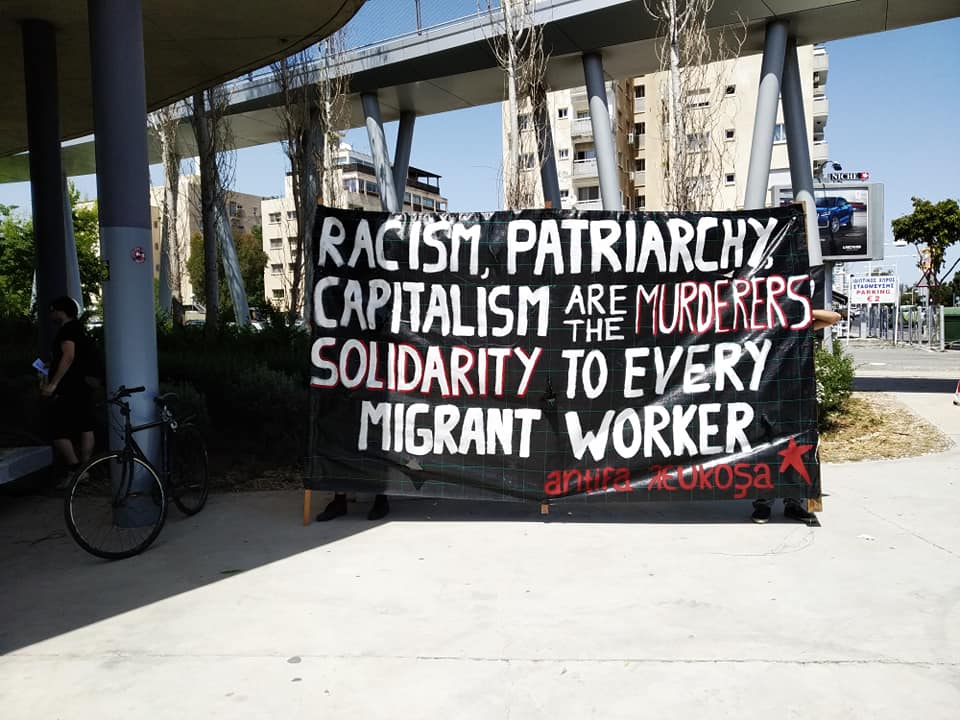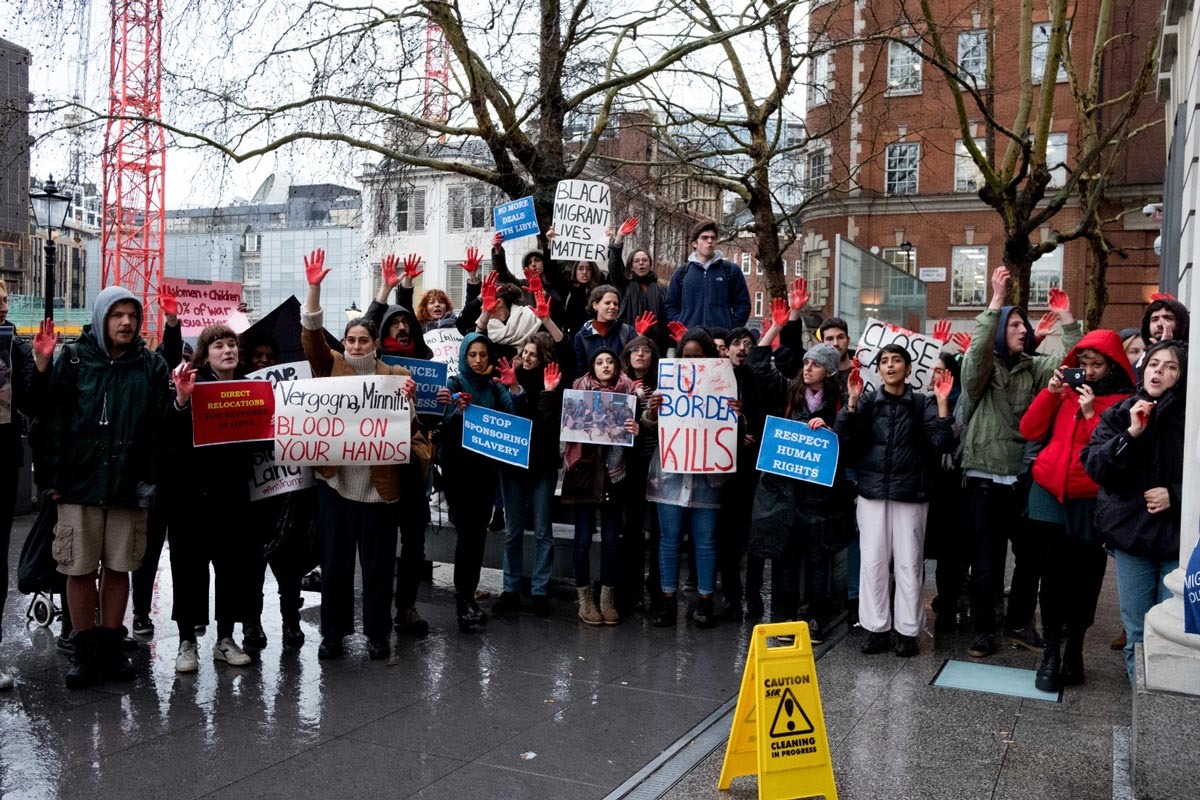Barriers to migrants surviving in the U.K don’t stop in Dover or at the passport gate but define their daily lives and impede their freedoms in a multitude of ways.
In April 2016 Plan C Birmingham took hosted a workshop during the week long ‘Beyond Borders‘ series of arts events hosted by GAP arts at Centrala gallery in Digbeth. Our workshop was a participatory session working with both migrants and left wing organisers to focus on four key ‘borders’ which refugees and those claiming asylum face even once they have reached British shores. We also participated in the fundraising aspect of the week by creating a postcard which was auctioned off at the end of the week. Money raised went into buying bikes and funding training for refugees in the city. The event itself was attended by around 35 people. After an introduction to the themes people split into groups and discussed each of the four barriers migrants face in the U.K: barriers in housing, economic barriers, barriers of the nation state and barriers in asylum cases. Below you can find the artwork and introductory text for each section of the workshop.
Nationalist Barriers
UK borders were first enforced in an organized and more violent fashion after the 1905 Aliens Act which enforced stricter bureaucracy than had ever before been experienced at the border. In response to the rush of Jewish migrants during the second world war, Britain controlled its borders ever more due to panic around the rising number of people coming from overseas.
Foreign policy plays a huge role in the current so-called ‘migrant crisis’, as it has directly affected the need to flee war-torn countries. Countries like Syria and Yemen are currently experiencing long-term, hard-hitting wars which have turned their countries into battlefields that civilians are desperately trying to escape with their lives. The UK funds Turkey and the Saudis in their bids to kill the citizens of Kurdistan and Yemen.
This all takes place within a colonial backdrop of Western imperialism and deeper issues of arbitrary border enforcement. Racism and segregation underlie the practices of European countries, the right wing media and politicians response to the ‘crisis’. The rise of fascist groups coincides with a general atmosphere of fear-mongering around the ‘morality’ of the migrants and the fear that they will ‘take jobs away’ from UK citizens. For this reason migrants are met with some open hostility, abuse and hate from some sections of the public and are likely to be discriminated against.
Language is used to segregate and subjugate with cuts to ESOL and austerity measures at large. These cuts always affect the most vulnerable in society; those who cannot afford to pay may no longer be able to access educational courses needed for valid qualifications in the UK. The number of migrants is minimal with 60 applications per 100,000 of the local population compared to the European average of 260 per 100,000.
These issues have highlighted the growing issues of fortress Europe i.e. the unwillingness of EU countries to allow those outside of the EU free and easy travel and access. With the upcoming EU referendum this is a major question for those in support of the EU.
Asylum seekers who fail in their initial claims are subject to destitution which means they lose all recourse to public funds. Though they can receive support in the form of accommodation and a small amount of money initially (on their first claim) this is all removed if their first case is rejected for any reason.
No asylum seekers currently have the right to work in UK before they are given refugee status, though in their initial claim they are entitled to accommodation and around £30 a week.
Employers are subject to inspections to check the ‘credentials’ of their workers, and are charged hefty fines if they are found to be employing people without the right to work in this country. However, those that choose to employ asylum seekers often do so for well below minimum wage, forcing them to work long hours with no guaranteed holiday. Due to the lack of worker’s rights in place there is little that asylum seekers can do to assert themselves in the workplace and many are subject to abuse from their employers. Though many asylum seekers are poor and often destitute, in low-paid, unlawful thus exploitative employment many of them are still sending money back to their families at home. Often the money they earn in the UK goes a lot further back home.
Asylum seekers have no access to the UK benefits system, meaning they rely on government provided or NGO provided housing and funds or upon illegal work. They cannot claim any housing benefit from the council and are therefore forced into staying wherever they can.
n order to gain UK citizenship after living in the UK on a shorter term visa (student visa, refugee status, work visa) new rules have come into place demanding that only those earning 35k or over will be given indefinite leave to remain (except in ‘protected professions’). This affects a wide range of migrants and refugees and exacerbates problems like destitution.
You can’t choose where you live. It’s unlikely you’ll get to live in London or south-east England.’ –from the government website on UK asylum seekers housing.
Migrants are dispersed into a wide range of areas in the UK, separating friends, family and communities. Birmingham is a key area, piloting racist schemes such as Right to Rent which forces landlords to check the asylum status of everyone they might rent to. In practice, this creates a hostile atmosphere for anyone who doesn’t seem ‘British’ enough and casts suspicions on the BME community as well as migrants. The landlord can be fined large sums if their residents turn out not to have permission to stay. Housing for asylum seekers is controlled by the Home Office through a private security company; G4S – often these properties are of a poor quality, overcrowded or unsuitable.
Raids are carried out on housing where undocumented asylum seekers and migrants are living/ suspected to be living. G4S send in bailiffs to forcibly (and often illegally) evict people from their homes, search their possessions or remove them to detention centres. This can happen for a number of reasons, with a large number of cases being unjustified even by law.
Asylum seekers can be sent to detention centres and held there for indefinite periods of time. They are held in detention, unable to leave and could be subject to forcible deportation at any time during their stay. The stated logic behind detention is that it makes processing easier, but it is mainly undertaken without trial (what’s called administrative detention) and is incredibly distressing.
There are some projects, such as The Hope Project, who provide housing for asylum seekers on an ad hoc basis using the homes of people willing to let them out for free to asylum seekers. Often, this isn’t a long term solution, however.
Unlawful process is often practiced in asylum seekers cases; skipping out steps in the out-lined process, denying access to housing and support to those entitled to it, overt physical violence, unlawful arrest, harassment, evictions with no legal basis etc.
Bureaucracy is a major barrier to many asylum cases – people are expected to produce official documents, identifications, legal proof etc. from their country of origins (which they often have no access to). The legal process demands paperwork, official registration, case files, documentation all, more often than not, in English.
Translation/language issues causes major problems in access to and understanding of the legal process, one’s rights and entitlements and ability to understand what is required in interviews. Whilst legal aid is being severely cut under the Tory government, limiting the number of solicitors willing and able to work pro bono (for free).
Right to work is currently denied to all those pending a decision on their asylum case, all those who have been rejected and all who are in the process of re-applying for asylum. All those outside of the EU must apply for a work visa in order to work inside the UK.
Detention is seen as a legitimate part of the legal process for those who fail in their initial asylum cases, though grounds for detention are never adequately explained.
The entire process has a profound impact upon the mental health of asylum seekers as they are forced to explain, live out and prove again and again the most traumatic experiences of their lives to the Home Office, solicitors, support groups and other services. Those kept in detention attempt suicide at alarmingly high rates.









